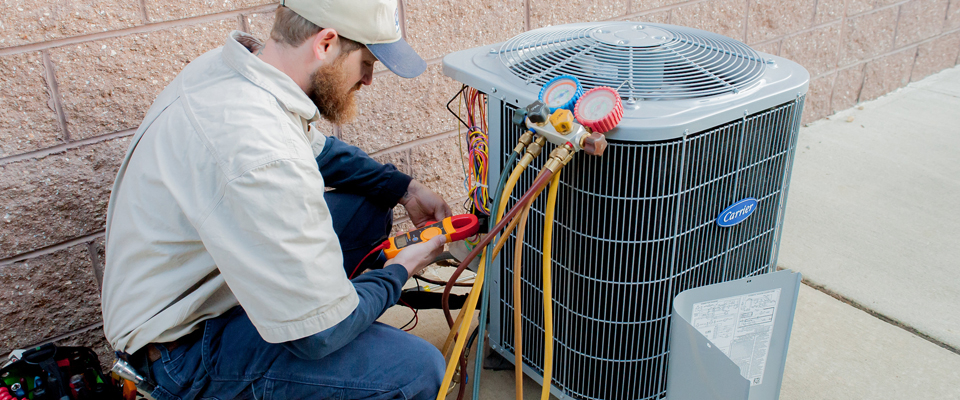Keep Your Home Ideal Year-Round with DMAKS HVAC Services.
Keep Your Home Ideal Year-Round with DMAKS HVAC Services.
Blog Article
Energy-Efficient A/c Systems to Minimize Energy Expenses
As energy expenses continue to climb, the value of energy-efficient HVAC systems becomes increasingly apparent. These systems not just assure substantial financial savings on utility expenses but additionally contribute to a much more lasting future by minimizing power usage. With different choices available, consisting of geothermal heatpump and ductless mini-splits, homeowner encounter a multitude of options that can improve convenience and air quality. Recognizing the vital features and maintenance demands is necessary to making the most of these advantages. What elements should be prioritized when selecting the appropriate system for your needs?
Advantages of Energy-Efficient Heating And Cooling Solutions
Energy-efficient A/c systems use many benefits that extend past mere expense financial savings. By consuming less power, these systems add to lower greenhouse gas exhausts, helping to combat environment modification and promote sustainability.
Additionally, energy-efficient heating and cooling systems frequently offer improved convenience levels. Several of these systems feature sophisticated technology that enables for much better temperature level control and boosted air top quality (DMAKS HVAC). This leads to a healthier interior atmosphere, which is specifically important for people with allergic reactions or respiratory concerns
Furthermore, investing in energy-efficient cooling and heating systems can boost building value. As more customers focus on energy performance, homes and structures outfitted with these systems might bring in greater quotes in the real estate market.
Kinds Of Energy-Efficient A/c Options
Just how can home owners and businesses select one of the most ideal energy-efficient a/c options for their demands? The marketplace provides a selection of energy-efficient HVAC systems, each made to improve comfort while decreasing power intake.
One choice is the variable cooling agent flow (VRF) system, which efficiently regulates the temperature level in multiple zones within a building. This system adapts its cooling agent flow to match the preferred temperature, resulting in substantial power financial savings.
An additional preferred choice is geothermal warmth pumps, which use the planet's stable temperature to warm and amazing spaces. By transferring heat to and from the ground, these systems demonstrate excellent performance, especially in modest environments.
Furthermore, ductless mini-split systems give an energy-efficient option for homes doing not have ductwork. These systems enable zone-specific heating & cooling, lowering energy waste in empty locations.
Lastly, high-efficiency heaters and air conditioning unit, with sophisticated SEER and AFUE ratings, provide trustworthy climate control while consuming less power than typical versions. By evaluating these choices, property owners and businesses can select a heating and cooling system customized to their details requirements and energy efficiency objectives.
Key Attributes to Take Into Consideration

Following, check out the kind of compressor used in the system. DMAKS HVAC. Variable-speed compressors can adjust their result to match the home heating or cooling demand, resulting in boosted convenience and power cost savings compared to single-speed versions. In addition, look for systems outfitted with smart thermostats that supply programmable setups and remote access, enabling far better control over energy usage
One more vital feature is the system's air purification capacity. High-efficiency filters can boost indoor air top quality and decrease energy usage by making sure the system operates successfully. Take into consideration the type of refrigerant used; modern-day systems commonly use green cooling agents that have a lower environmental influence.
Finally, make sure that read review the system is suitable with zoning innovation, which allows for customized temperature control in different areas of your home, boosting comfort while minimizing energy use.
Tips for Selecting the Right System


Following, take into consideration power effectiveness ratings, particularly the Seasonal Energy Efficiency Ratio (SEER) for cooling down systems and the Annual Gas Use Efficiency (AFUE) for heater. Higher ratings suggest higher effectiveness, which can lead to substantial financial savings on utility costs with time.
Furthermore, evaluate the kind of cooling and heating system that ideal suits your way of living and budget plan. Options consist of central air, ductless mini-splits, and warm pumps, each with its own collection of advantages and drawbacks.
Do not overlook the value of appropriate installation and sizing; an inaccurately sized system can result in inefficiencies and raised wear. Consult with a professional A/c specialist to get professional recommendations customized to your home's special needs. This thorough strategy will make sure that you select an energy-efficient HVAC system that meets your requirements and budget plan efficiently.
Upkeep for Optimal Efficiency
When the best HVAC system is in area, recurring upkeep comes to be key to guaranteeing ideal efficiency Bonuses and long life. A properly maintained system runs more successfully, leading to lower power consumption and minimized utility costs. Regular examinations and you can try this out tune-ups need to be arranged a minimum of two times a year-- as soon as prior to the cooling period and once prior to the heating period.

Home owners ought to additionally be vigilant about checking their heating and cooling system's efficiency. Uncommon sounds, fluctuating temperature levels, or boosted energy expenses can suggest underlying problems that call for immediate focus. By addressing these worries immediately, property owners can prevent pricey repair work and prolong the life-span of their systems.
Investing in an upkeep plan with a qualified specialist not just enhances effectiveness however likewise offers assurance, understanding that the system is operating at its ideal. DMAKS HVAC. Normal maintenance is as a result important for maintaining energy performance and reducing total functional costs
Final Thought
To conclude, energy-efficient HVAC systems present a feasible remedy for decreasing utility expenses while improving convenience and air top quality. By integrating sophisticated innovations and alternatives such as geothermal warm pumps and ductless mini-splits, residential property owners can accomplish substantial power financial savings and add to ecological sustainability. Careful factor to consider of system attributes and recurring maintenance better makes certain optimum performance, making energy-efficient systems a prudent financial investment for both economic and ecological advantages.
Report this page